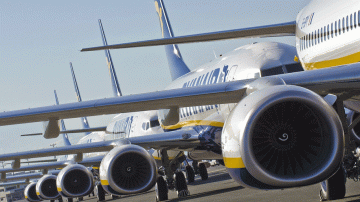
Jordan is reigniting its ailing tourism figures by attracting low-cost carriers, according to the head of the country’s tourism board.
European airlines were encouraged to enter the market by an exemption from departure taxes, marketing offered by the Jordan Tourism Board, and routes with little or no competition, Abed Al Razzaq Arabiyat told Business Traveller at this week’s World Travel Market in London.
Low-cost airlines Easyjet, Ryanair and Norwegian have all launched direct flights between European cities and Jordan this year.
The Arab country entered a Common Aviation Area agreement with the EU in 2010, enabling airlines to fly direct from anywhere in the EU.
But it was not until this year that Ryanair became the first low-cost carrier to offer Europeans a link to Jordan, announcing 14 routes to Amman and Aqaba able to transport almost half a million passengers a year. Most of these, including a Germany-Jordan route, launched last month.
Easyjet later announced it would begin the first direct flights between the UK and the Jordanian city Aqaba in November.
The Easyjet route was also the first low-cost option between Jordan and the UK, with flights on British Airways and Royal Jordanian costing around £500 return. Flights early next year on Easyjet are currently less than £100 each way.
Jordan waived the departure tax for airlines two years ago.
“Now we have results because of that,” Arabiyat said yesterday, calling the arrival of low-cost carriers “a big achievement.”
“Our strategy is to retain that support. Next year we want to increase [the number of] low-cost flights even more, with more flights from Easyjet.”
Arabiyat said it was a way to diversify Jordan’s source markets and promote the country as a short break option from Europe. He said the tourism board would also attempt to attract religious, adventure, medical and wellness tourism in 2019.
Around $20bn has been spent on recent tourism projects such as the new Ayla golf course in Aqaba designed by Greg Norman.
Arabiyat also emphasised the importance of digital outreach, with the tourism board inviting hundreds of ‘online influencers’ to Jordan who are not paid but get free trips in the hope that they will share positive experiences of the country on social media.
Tourism numbers fell dramatically following the Arab Spring at the start of the decade. In 2010 Jordan had around eight million tourists while last year it saw 4.2 million – itself a 15 per cent increase on 2016.
Arabiyat said tourist growth had exceeded government targets at 14 per cent in the months to September. The European market saw a 26 per cent increase, Asian 18 per cent and Arab 22 per cent.
“Ryanair’s decision to fly to Jordan sends a loud and clear message about the diversity and the untapped potential of Jordan’s tourism product,” Minister for Tourism Lina Mazhar Annab said earlier this year.
“It also shows confidence in the tourism industry in Jordan, which has witnessed double-digit growth in the past year.”












